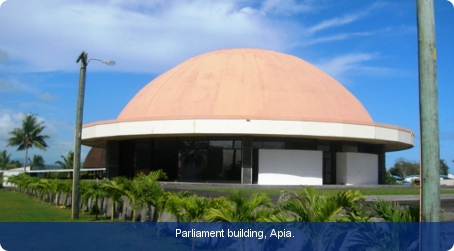Government
- Overview
- History

Samoa is a democracy with a unicameral legislature, the Fono. The head of state is similar to a constitutional monarch. Under the constitution, the head of state is elected by the Fono for five years. However, by a special arrangement decided on in 1962 when the constitution came into force, Malietoa Tanumafili II and one other senior chief (who died in 1963) were to hold the office for life. On Malietoa’s death in 2007, Samoa became a republic, and the Fono elected Tuiatua Tupua Tamasese Efi as head of state for five years.
The prime minister is the head of government and is appointed by the head of state. The prime minister must be a member of the Fono and be supported by a majority of its members. He or she selects 12 members of the Fono to form a cabinet, which has charge of executive government. The head of state must assent to new legislation.
The Fono has 49 members. 47 of these are elected in 41 constituencies by universal adult suffrage, to be contested only by matai title holders (chiefs of agia or extended families of whom there are around 25,000), and two elected from separate electoral rolls comprising those of foreign descent. The Fono sits for five-year terms.
Until 1991 only the matai were eligible to vote, but following a plebiscite universal adult suffrage was introduced in time for that year’s election. The matai, whose office is elective for life, still administer local government in the traditional manner. They are trustees for customary land held on behalf of the people; this land makes up about 80% of all the land in the country.
The Supreme Court is presided over by the chief justice, and has jurisdiction over both civil and criminal matters. The Court of Appeal, whose president is the chief justice, deals with appeals from the lower courts.
There are two district courts (‘magistrates’ courts’ until 1998), and the Land and Titles Court, whose president is a judge of the Supreme Court, and which has jurisdiction in disputes over land.

The name Samoa, from Sa (‘sacred’) and Moa (‘centre’) means ‘Sacred Centre of the Universe’. It is an archipelago of nine islands at the centre of the south-west Pacific island groups. Today, throughout Polynesia, Samoans are nicknamed the ‘happy people’.
On the basis of archaeological evidence, Samoa seems to have been inhabited at least as far back as 1000 BC by Austronesian-speaking people. Evidence from legends and genealogies shows that the country had frequent contact with Fiji and Tonga from the mid-thirteenth century. There was some European contact in the first half of the eighteenth century, and settlement by refugees and beachcombers until the early nineteenth century.
In 1889, Germany annexed Western Samoa and the USA annexed Eastern Samoa. In 1914 the New Zealand army occupied Western Samoa and in 1919 the League of Nations gave New Zealand a mandate to administer the whole country. After the Second World War the country was made a UN trust territory.
At a plebiscite organised by the UN and held in 1961, the nation voted for independence. The country became independent on 1 January 1962, the first South Pacific island country to do so. In 1997, by act of parliament, the country changed its name from Western Samoa to Samoa. This change, though it had been under discussion for some time, had been delayed by awareness of the sensitivities of American Samoa. In the end, American Samoa offered no opposition.
In the general election in March 2001, the ruling Human Rights Protection Party (HRPP) won more seats than any other party. Despite being challenged by the combined strength of a number of opposition parties, the HRPP leader Tuilaepa Sailele Malielegaoi (prime minister since 1998) was re-elected. Enough independents joined the HRPP to give it an absolute majority.
The general election of 2006 saw a return to power of the HRPP. In the March 2011 general election the HRPP was returned with an increased majority. Tuilaepa Sailele Malielegaoi remained as prime minister.



